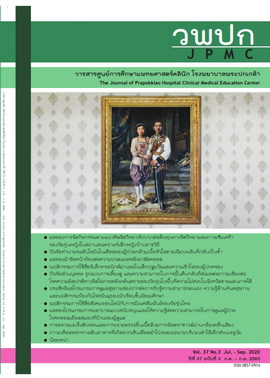Social Media Usage Behavior and Sexual Intercourse among Thai Adolescents
Main Article Content
Abstract
Background: Thai adolescents tend to engage in sexual risk behavior; furthermore, social media usage behavior is a significant factor linked to sexual intercourse in this group of people.
Objective: This study aimed to examine the social media usage behavior and to identify the factors associated with sexual intercourse among Thai adolescents.
Materials and Method: This research was a cross-sectional study. A multistage random sampling was used to recruit 1,321 adolescents from five universities throughout Thailand. Data were collected by an online questionnaire. Descriptive statistics and binary logistic regression at a 95% confidence interval of the odds ratio were used to analyze the data.
Results: The results revealed that 99.8% of university students had access to social media with an average usage of 7.2 hours per day, 72.9% had access to sexual media, and 27.6% had had sexual intercourse. The factors related to sexual intercourse were the access to social media more than six hours per day (adjusted odds ratio [AOR]=1.48; 95%CI=1.14-1.91), access to uncensored pornographic video clips (AOR=2.05; 95%CI=1.37-3.10), pornographic video sharing (AOR=1.83; 95%CI=1.10-3.05), access to pornographic videos along with their partners. (AOR=4.31; 95%CI=2.96-6.26), searching for sexual information online (AOR=1.61; 95%CI=1.09-2.40), and searching for STDs/AIDS prevention (AOR=1.60; 95%CI=1.06-2.43).
Conclusion: The results proved that the access to social media were significantly associated with sexual intercourse in adolescents. The findings suggested that stakeholders should promote innovative strategies to enhance adolescents’ skills in the access to social media, specifically regarding sexual information and STDs/AIDS prevention.
Article Details
References
Williamson A. Social media guidelines for parliaments [Internet]. 2013 [cited 2020 Feb 2]. Available form: http://archive.ipu.org/PDF/publications/SMG2013EN.pdf
Ministry of Digital Economy and Society. The 2018 household survey on the use of information and communication technology (quarter 4). Bangkok: National Statistical Office; 2018.
NIDA Poll. Social media and the future of Thai youth [Internet]. 2017 [cited 2020 Feb 2]. Available form: http://nidapoll.nida.ac.th/file_upload/poll/document/20170331025107.pdf
Hoyrat P, Wongsawat P. Thai adolescent with early sexual intercourse. Journal of Phrapokklao Nursing College 2017; 28(2):173-82.
Roemsri J, Thularate N. The impact of social media use among adolescents. SVIT Journal 2018; 3(1):11-20.
Pounglek W. Internet Pornography: Risk caution and Prevention guideline against its effects on Thai youth. Executive Journal 2011; 31(2):223-33.
World Health Organization. Thailand 2015 global school-based student health survey. Bangkok: WHO Thailand Country Office; 2017.
Ministry of Public Health. National disease surveillance (Report 506), 2008–2015. Nonthaburi: Bureau of Epidemiology, Ministry of Public Health; 2015.
Bureau of Epidemiology, Department of Disease Control, Ministry of Public Health. Surveillance behaviors associated with HIV infection among students in Thailand, 2018 [Internet]. 2019 [cited 2020 Apr 5]; Available form: http://aidsboe.moph.go.th/app/bookup/uploads/2020-04-281980464360.pdf
Cochran WG. Sampling techniques. 3rd edition. New York: John Wiley & Sons; 1997.
Thongnopakun S, Maharachpong N, Abdullakasim P. Factors related to the sexual behaviors among youth in Universities location in Eastern Region of Thailand. J Med Assoc Thai 2016; 99:43-50.
Sittipiyasakul V, Nuwong P, Lucksitanon R, Uamasan B. A survey on sexual experiences, opinions and sexual risk behaviors among teenage students in Thailand. Journal of Health Science 2013; 22(6):979-87.
Pupunhong W, Wuttisin K, Traitip T. Factors related to sexual behavior of teenagers in Amphoe Meuang Kalasin Province. Prae-wa Kalasin Journal of Kalasin University 2016; 3(2):54-72.
Luangchaikul W, Polyota T. Social learning processes leading to premarital sex: a case study of undergraduate students. ManutsatParitat: Journal of Humanities 2014; 35(2):37-56.

